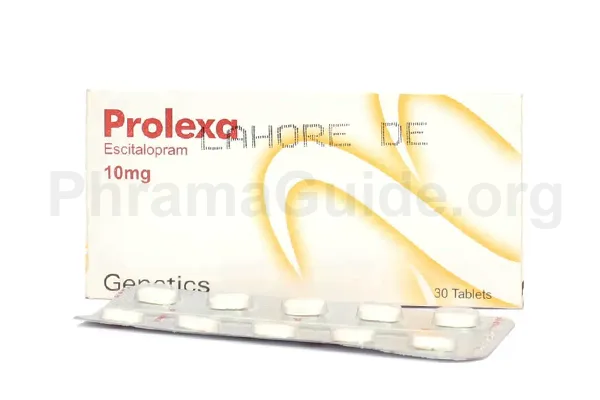Prolexa tablet is primarily used for the treatment of major depressive disorder and generalized anxiety disorder. It belongs to the selective serotonin reuptake inhibitor (SSRI) class of antidepressants. Following are some common uses of Prolexa Tablet:
- Major Depressive Disorder (MDD): Prolexa tablet is commonly used for the treatment of MDD, a mental health condition characterized by persistent feelings of sadness, loss of interest or pleasure, changes in appetite and sleep patterns, low energy, and difficulty concentrating. It helps to improve mood, reduce depressive symptoms, and enhance overall well-being.
- Generalized Anxiety Disorder (GAD): Prolexa tablet is also used for the treatment of GAD, a condition characterized by excessive and uncontrollable worry and anxiety about various aspects of life. It helps to reduce anxiety symptoms, promote relaxation, and improve daily functioning.
Off-label Uses of Prolexa Tablet
In addition to these approved uses, Prolexa may sometimes be used off-label for other conditions, such as:
- Panic Disorder: Prolexa tablets can be used off-label to treat panic disorder, a condition characterized by recurrent panic attacks and intense fear or discomfort. It helps reduce the frequency and severity of panic attacks and associated symptoms.
- Social Anxiety Disorder: Prolexa tablets may be used for social anxiety disorder (also known as social phobia), a condition marked by fear and avoidance of social situations due to concerns about being judged or embarrassed. It helps reduce anxiety in social settings and improve social functioning.

What is Prolexa?
Prolexa is one of the leading brands of Escitalopram, manufactured and marketed by Genetic Pharmaceuticals. Pakistan.
Prolexa Alternatives : Other Similar Brands
The following are some alternative brands of Prolexa and their manufacturers.
- Cipralex : Lundbeck Pakistan (Pvt) Ltd.
- Estar : Pharmevo (Pvt) Ltd, Pakistan.
- Citanew : Hilton Pharmaceuticals (Pvt) Ltd, Pakistan.
- Morcet : Searle Pakistan Ltd.
- Depsit : Genix Pharmaceuticals (Pvt) Ltd, Pakistan.
- Ufrim : High Q Pharmaceuticals, Pakistan.
- Exapro : Consolidated Chemical Laboratories (Pvt) Ltd, Pakistan.
- Lexapro : Navegal Laboratories.
- Seradep : Barrett Hodgson Pakistan (Pvt) Ltd.
- Zevget : Getz Pharmaceuticals (Pvt) Ltd, Pakistan.
- Questa : Bosch Pharmaceuticals (Pvt) Ltd, Pakistan.
Prolexa : Available Formulations and Strengths
Presently, Prolexa is available in Tablet Form with the following Strengths.
Prolexa Tablet : 10mg and 20mg Strengths.
Who Should Not Use Prolexa?
Prolexa has several contraindications, which are specific situations or conditions where the use of Prolexa is not recommended due to the potential risks outweighing the benefits.
Hypersensitivity: Prolexa is contraindicated in individuals who have a known hypersensitivity or allergy to Prolexa or other selective serotonin reuptake inhibitors (SSRIs). Allergic reactions can range from mild to severe and may include rash, itching, swelling, or difficulty breathing.
Concomitant use with monoamine oxidase inhibitors (MAOIs): Prolexa should not be used within 14 days of discontinuing treatment with an MAOI or in combination with an MAOI due to the potential for a serious drug interaction. The combination can lead to a group of symptoms known as serotonin syndrome, which can be life-threatening and may include agitation, hallucinations, rapid heartbeat, increased body temperature, tremors, and muscle stiffness.
Concomitant use with pimozide or citalopram: Prolexa should not be used in combination with pimozide or citalopram due to the potential for QT prolongation, which can increase the risk of abnormal heart rhythm.
Use in patients taking linezolid or intravenous methylene blue: Prolexa is contraindicated in individuals who are currently taking or have recently taken, linezolid (an antibiotic) or intravenous methylene blue. Concomitant use can increase the risk of serotonin syndrome.
Use in patients with known congenital long QT syndrome: Prolexa should be avoided in individuals with a known history of congenital long QT syndrome due to the potential for QT interval prolongation, which can increase the risk of abnormal heart rhythm.
Use in patients with severe hepatic impairment: Prolexa is contraindicated in individuals with severe hepatic impairment, as it may impair the metabolism and clearance of the medication, leading to increased drug levels and potential toxicity.
What is the Recommended Daily Dosage of Prolexa?
Prolexa Dose for Major depressive disorder:
-
- Adults: One Tablet of 10mg, once daily, either in the morning or evening.
The dose may be increased gradually up to a maximum of 20 mg per day, based on the individual’s response and tolerability. - Elderly patients (≥65 years): A Half tablet of 10mg, once daily.
The dose may be increased cautiously based on the individual’s response.
- Adults: One Tablet of 10mg, once daily, either in the morning or evening.
Prolexa Dose for Generalized Anxiety Disorder:
-
- Adults: One Tablet of 10mg, once daily, either in the morning or evening.
The dose may be increased gradually up to a maximum of 20 mg per day, based on the individual’s response and tolerability. - Elderly patients (≥65 years): A Half tablet of 10mg, once daily.
The dose may be increased cautiously based on the individual’s response.
- Adults: One Tablet of 10mg, once daily, either in the morning or evening.
How Prolexa Works?
Prolexa works by selectively inhibiting the reuptake of serotonin, a neurotransmitter in the brain. It is an SSRI (selective serotonin reuptake inhibitor), meaning it specifically targets the reuptake of serotonin and increases its availability in the synaptic cleft, the space between nerve cells.

Leave A Comment